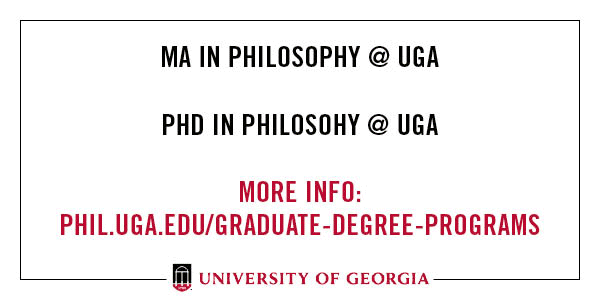Online Philosophy Resources Weekly Update
Here’s the report on new and revised entries in online philosophy resources and new reviews of philosophy books.

New:
- Medieval Theories of Conscience, Peter Eardley.
Revised:
- Internet Research Ethics, by Elizabeth A. Buchanan and Michael Zimmer.
- Perceptual Experience and Concepts in Classical Indian Philosophy, by Monima Chadha.
- al-Farabi’s Philosophy of Society and Religion, by Nadja Germann.
- Mysticism in Arabic and Islamic Philosophy, by Mehdi Aminrazavi.
- The Philosophy of Computer Science, by Nicola Angius, Giuseppe Primiero, and Raymond Turner.
IEP ∅
NDPR ∅
1000-Word Philosophy ∅
Recent Philosophy Book Reviews in Non-Academic Media
- On The Suffering of the World by Arthur Schopenhauer, edited by Eugene Thacker, reviewed by Michael Dirda in The Washington Post.
- Life After Privacy: Reclaiming Democracy in a Surveillance Society by Firmin DeBrabander, reviewed by Evan Selinger in The Los Angeles Review of Books.
Compiled by Michael Glawson



Re: the revised SEP entry on “Perceptual Experience and Concepts in Classical Indian Philosophy:”
This entry provides a fine introduction, however, It seems Lokāyata/Cārvāka, a rational and secular worldview/philosophy, typically characterized as materialist, with a strong skeptical current in keeping with a pluralist construal of this philosophy, entertains views on perceptual experience and concepts that do not count as (or at least have no bearing upon) classical Indian philosophy. This standpoint reinforces the common idea or prejudice that philosophy in Indic traditions is invariably or at bottom religious; in other words, concerned with salvific-like goals of spiritual liberation or freedom from suffering and thus rebirth: “It is true that the classical Indian philosophers were seriously concerned with the notions of enlightenment, the highest good, freedom from the cycle of rebirth and the attainment of ultimate bliss, etc.” However, given fidelity to principles of philosophical charity, humanity, and nonviolence, it behooves us not to ignore the “mitigated-empiricism” of Cārvāka epistemology which, for example, makes “avoidance of pragmatic contradiction … a criterion of acceptability of inferences,” thus rejecting the
“… the transcendent inferences of non-Cārvākas which do not have pragmatic necessity. It may be noted here that ‘pragmatic necessity’ includes empirical and logical necessity. Hence these Cārvākas are suggesting here that we should not accept inferences unless they are based on logical, empirical, or pragmatic necessity.”
Thus, if we fancy ourselves philosophers (be it professional or amateur), or believe we are in possession of a philosophical temperament, we should appreciate the fact that “the Cārvāka criticism of inference (anumāna) as pramāna [a reliable or genuine means of valid or correct knowledge or knowing or cognition; implies logical proof] should not be taken as criticism of inference in general.” This materialist philosophy thus provides us with a somewhat unique perspective or position among the Indic philosophical views (including that of the Grammarians) discussed in this entry. Cārvāka materialist (and naturalist) views—in plural form because I am persuaded by Pradeep P. Gokhale’s argument for a “pluralist approach to Cārvāka-darśana”—provides us with a unique treatment of perceptual experience that differs not only from the orthodox Indian philosophies (which accept the metaphysical and epistemic authority of the Vedas or Śruti), but distinguishes itself from non-orthodox systems as well, such as Jainism and Buddhism. Please see Gokhale’s book, Lokāyata/Cārvāka: A Philosophical Inquiry (Oxford University Press, 2015).